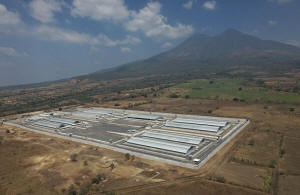Legal showdown as Justice Department resists judge's demand for more
details on deportation flights
[March 20, 2025]
By ALANNA DURKIN RICHER and LINDSAY WHITEHURST
WASHINGTON (AP) — The Justice Department is resisting a federal judge's
demand for more information about flights that took deportees to El
Salvador, arguing on Wednesday that the court should end its “continued
intrusions” into the authority of the executive branch.
It's the latest development in a showdown between the Trump
administration and the judge who temporarily blocked deportations under
an 18th century wartime declaration. President Donald Trump has called
for the judge's impeachment as the Republican escalates his conflict
with a judiciary after a series of court setbacks over his executive
actions.
U.S. District Judge James E. Boasberg, who was nominated to the federal
bench by Democratic President Barack Obama, had ordered the Trump
administration to answer several questions under seal, where the
information would not be publicly exposed. There were questions about
the planes' takeoff and landing times, and the number of people deported
under Trump’s proclamation.
The judge has questioned whether the Trump administration ignored his
court order on Saturday to turn around planes with deportees headed for
the Central American country, which had has agreed to house them in a
notorious prison.
In court papers filed hours before the deadline to respond Wednesday,
the Justice Department said the judge's questions are “grave
encroachments on core aspects of absolute and unreviewable Executive
Branch authority relating to national security, foreign relations and
foreign policy." The department said it was considering invoking the
“state secrets privilege” to allow the government to withhold some of
the information sought by the court.

“The underlying premise of these orders ... is that the Judicial Branch
is superior to the Executive Branch, particularly on non-legal matters
involving foreign affairs and national security. The Government
disagrees,” Justice Department lawyers wrote. “The two branches are
co-equal, and the Court's continued intrusions into the prerogatives of
the Executive Branch, especially on a non-legal and factually irrelevant
matter, should end.”
Boasberg later issued an order giving the administration until Thursday
at 12 p.m. EDT to either provide the requested information or make a
claim that it must be withheld because it would harm “state secrets.” He
took issue with the government's characterization of his request as a
“unnecessary judicial fishing” expedition, saying it was necessary to
“determine if the government deliberately flouted” his order to turn
around the flights, “and if so, what the consequences should be.”
[to top of second column]
|

A mega-prison known as Detention Center Against Terrorism (CECOT)
stands in Tecoluca, El Salvador, March 5, 2023. (AP Photo/Salvador
Melendez, File)

He also questioned how providing the information to the court could
“jeopardize state secrets,” given that administration officials have
already publicly released many details about the flights.
Trump invoked the Alien Enemies Act, which has only been used three
times before in U.S. history, all during congressionally declared
wars, and claimed there was an invasion by the Venezuelan gang Tren
de Aragua.
Boasberg ordered the administration not to deport, through that 1798
law, anyone in its custody.
Told there were planes in the air headed to El Salvador, Boasberg
said Saturday evening that he and the government needed to move
fast. “You shall inform your clients of this immediately, and that
any plane containing these folks that is going to take off or is in
the air needs to be returned to the United States,” Boasberg told
the government’s lawyer.
Hours later, El Salvador’s president, Nayib Bukele, said the
deportees had arrived in his country. "Oopsie...too late” he said in
a social media post, above an article referencing Boasberg’s
original order.
The administration contends that a judge lacks the authority to tell
the president whether he can determine the country is being invaded
under the act, or how to defend it.
Boasberg's new order for answers came after the administration
provided limited information in response to a sharp questioning from
the judge at a Monday hearing.
The administration said in a filing Tuesday that two planes took off
before Boasberg’s order went into effect, and a third plane that
took off after the ruling came down did not include anyone deported
under the law. The administration declined, however, to provide
estimates about the number of people subject to the proclamation.
White House press secretary Karoline Leavitt told reporters during a
Monday briefing that about 261 people were deported, including 137
under the law.
All contents © copyright 2025 Associated Press. All rights reserved
 |